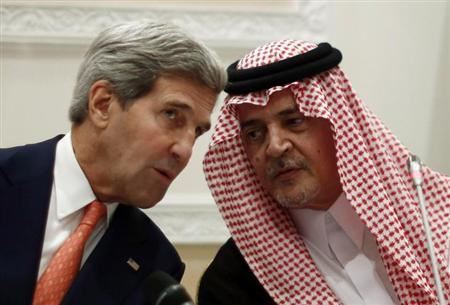Saudi officials told the U.S. Secretary of State John Kerry- who visited Riyadh earlier this week- that “Geneva II” and the negotiation with Iran will be at their expense
Nidal Hamadeh
As a direct expression of the fear felt by the ruling family in the Kingdom because of the new American tendencies in the region, Saudi officials told the U.S. Secretary of State John Kerry- who visited Riyadh earlier this week- that “Geneva II” and the negotiation with Iran will be at their expense.
 Kerry told the Saudis that “we have heard this position also in Israel,” and that the US can postpone “Geneva II” conference so as to pave the way for the Syrian opposition to agree on a unified delegation to go to negotiate with the regime. As for negotiating with Iran, this matter cannot be stopped and is related to the P5+1countries who are negotiating with Iran over its nuclear program.
Kerry told the Saudis that “we have heard this position also in Israel,” and that the US can postpone “Geneva II” conference so as to pave the way for the Syrian opposition to agree on a unified delegation to go to negotiate with the regime. As for negotiating with Iran, this matter cannot be stopped and is related to the P5+1countries who are negotiating with Iran over its nuclear program.
The Saudis reminded the U.S. Secretary of State of their huge and determined role in contributing to collapsing the Soviet Union, either through financing and mobilizing the Muslims in the war against the Red Army in Afghanistan, or through the American-Saudi agreement to flood the world market with oil, which was concluded during King Fahd bin Abdul Aziz’s visit to Washington in early 1985. Saudi Arabia fully implemented the agreement, directly causing the fall of the Soviet Union economically and thus it collapsed. Therefore, the Saudis expressed their surprise that the United States is entering into agreements with the enemies of the Kingdom at the expense of Saudi Arabia.
Kerry responded saying that the United States is fully committed to the security of Saudi Arabia and the Gulf states, and that the agreement with Iran will lift the risk of allowing Tehran to acquire nuclear weapons facing these states. He added that America wants from Tehran not to undertake any military activities in its nuclear program.
On the other hand, Syrian opposition sources said that the Saudis informed the opposition coalition and the loyal groups in the Syrian opposition of the U.S. administration’s decision to enter into agreement with Russia. Moreover, they also informed them that they thus must work to frustrate the Russian-American agreement, because America, according to the Saudi opinion, will be forced in the end to intervene militarily in Syria if the Syrian war continued and if no political agreement has been reached. Hence, the opposition has to reject any form of negotiation with the regime and to impede the holding of the “Geneva II” conference, which is considered the fruit of an American-Russian consensus, based upon which Russia imposed its conditions, primarily preserving the current regime in Syria. This opinion is also adopted by Syrian opposition sides that are still hoping that the U.S. will interfere militarily and will overthrow the regime in Damascus.
The Syrian opposition sources added that Saudi Arabia is trying to circumvent the Russian - American agreement and to hold the “Geneva II” conference to impose a new fait accompli on the ground by trying to unite the armed factions in the north and in the Damascus countryside under one leadership and one united operations room for each of the two areas.
According to two sources in the Syrian opposition, Damascus has threatened late September to bomb the Jordanian capital Amman, if Jordan fulfilled the Saudi desire to make the border area between the two countries similar to the Turkish-Syrian border through enabling Saudi Arabia to supply and equip thousands of militants on the border between Jordan and Syria.
The two sources emphasize that the Jordanian intelligence dealt seriously with this Syrian threat, and provided security assistance to the Syrian army in the towns of Daraa countryside, what led to the killing of “Yasser Aboud”, the commander of the operations room of the southern region of the Free Syrian Army. He was tightly ambushed and killed in the city of Tafas southern Syria on 21 October, and four top leaders of the armed groups were also killed as well. The opposition sources indicate that these leaders do not usually meet but only in the event of planning to launch a major military operation, and it seems that the goal of this meeting was to prepare for an attack on a Syrian army positions in the strategic al-Harra hill southern Syria.
Translated by: Mayssa Hazimeh